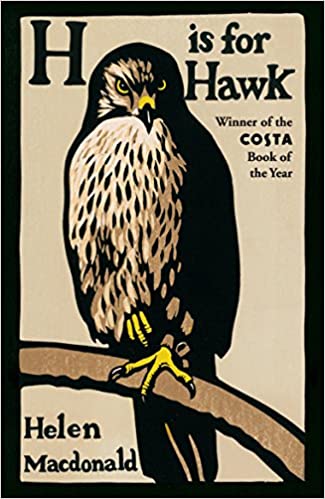Grief, like a violent storm, has a span. While a storm usually spends itself after an hour or two, leaving behind a trail of devastation, the intensity of grief does not peter out that quick. It lasts for several months, in some cases for years. In most such instances, one doesn’t really know how to come to terms with it. A case in point is the moving memoir: H is for Hawk (2014), authored by Helen Macdonald.
One day, while on the road photographing a stormy weather, Helen’s father, a journalist-photographer, collapsed, and later died in a hospital. Helen was devastated. She went into self isolation, cutting away from family, friends, job et al. Her only concern was to contact her father’s soul somehow anyhow.
During her childhood, Helen developed a hobby: bird-watching, largely influenced by her father, whose pastime was plane-spotting. The only way, she thought, to overcome the overpowering sadness was to pursue her passion and locate her father. So, she turned into a falconer. She bought a wild goshawk; put her life on the line training it. For days she teetered on the edge of existence, alarmingly close to being snuffed out. Then one day penning a discourse and delivering it at her father’s memorial service, she gained a new insight: “Respect the living, honour the dead. Leave them be.”
For obvious reasons, the book resonated with me. In the year 2003, a few weeks before Durga Puja, I got an assignment from the then editor of Asian Age Festival Magazine to do a short story for them. Shortly after, before I could pen a line, my father passed away. The sudden disappearance of my most favourite man took the wind out of my sails. The deadline was looming. Many times, I thought of cancelling the assignment.
It’s then the years of journaling habit first thing in the morning that helped me scribble a few words at a time. The publication of the story a month later brought some semblance of order, and it dawned on me that the only way to make peace with the loss was to write about my father often and thus exorcise the grief. It worked.
Whatever or however unpleasant moment life throws at us and it will, we can neither run away from it, nor make it disappear by a sleight of hand.
We have to learn to co-exist with the pitfalls; and any passion, if it is pure, can enormously help us to first gradually accept the reality before getting reconciled to some of life’s irretrievable losses.
At the end of the book, Helen by chance discovers a memento that reminds her of her father’s sage advice: “You have to be patient if you want to see something very much; you just have to be patient and wait.
